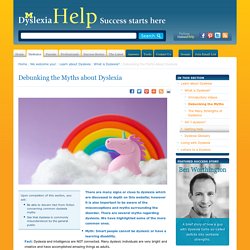

Extra_resources_Week_4.pdf. Selecting_reading_texts.pdf. Language Learning and Musical Activities (LLAMA) – ELT well. JUST CONFIRMED: Our next workshop is running in London on Saturday, 1st February, 2020.
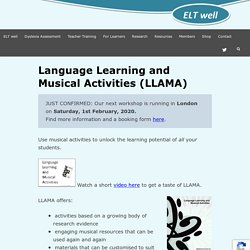
Find more information and a booking form here. Use musical activities to unlock the learning potential of all your students. Watch a short video here to get a taste of LLAMA. LLAMA offers: activities based on a growing body of research evidence engaging musical resources that can be used again and again materials that can be customised to suit any group of students suggestions for differentiation within each activity all the resources and explanations needed, so teachers don’t need to be musicians to use the activities a starting point to raise awareness of specific aspects of language, and encourage future practice Listen to a sample of the activity ‘The Phoneme Song‘.
Literacy practices improve, and motivation increases as students experience success, while enjoying learning. /html5/page.php?kid1=t_a2a73d44fc4be1_f9679d643cffd4&kid2=t_a2a73d44fc4be1. /html5/page.php?kid1=t_a2a73d44fc4be1_c01339961489eb&kid2=t_a2a73d44fc4be1. Dyslexia 2020 - Week 4. Microsoft Word - Spelling Fact Sheet 10-18-111 Moats added refs pdf. Microsoft Word - Unit 6 Task 4 Step 2b.doc. Microsoft Word - Unit 6 Task 4 Step 2b.doc. Microsoft Word - Unit 6 Task 4 Step 2a-1.doc. PhonologicalawarenessPPT.pdf. Extra_resources_Week_3.pdf. Untitled. English - BBC Teach. Phonetics Focus - A Sound Choice. English Vocabulary Quizzes Using Images. a4esl.org English Vocabulary Quizzes Using Images Quizzes to Help You Learn and Review Vocabulary This is a part of The Internet TESL Journal's Activities for ESL Students <HR NOSHADE SIZE=99><h1>Warning</h2><B>These quizzes require a JavaScript-enabled browser</b><BR><TT>You have JavaScript disabled or a browser that doesn't support JavaScript.
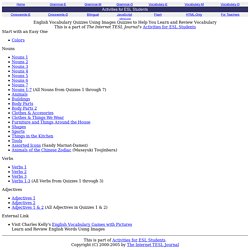
<BR><TT>You need either Netscape 3 or newer OR Explorer 4.0 or newer. <P>Try <a href=" Quizzes for ESL Students</a> instead. Start with an Easy One Colors Nouns Verbs Adjectives External Link Visit Charles Kelly's English Vocabulary Games with PicturesLearn and Review English Words Using Images. Untitled. Websites_Apps_Dyslexia_-_Copy2020.pdf. Extra_resources_Week_2.pdf. Apps for Dyslexia and Learning Disabilities. Apps for Dyslexia and Learning Disabilities. Wheel 0f Apps V1 0. Websites_Apps_Dyslexia_-_Copy2020.pdf. The effect of read-aloud assistance on the text comprehension of dyslexic and non-dyslexic English language learners - Milena Košak-Babuder, Judit Kormos, Michael Ratajczak, Karmen Pižorn, 2019.
ENGaGE Task Bank. Specific Learning Difficulties. Published 23 March 2020 The sudden switch to online learning, now happening in many countries, could potentially disadvantage students with Specific Learning Difficulties (SpLDs).
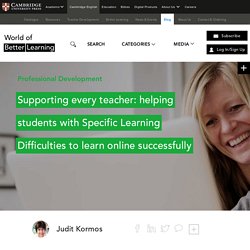
In the rush to set up various digital platforms, employ different tools and assign tasks, the needs of students with SpLDs might be ignored or temporarily delegated to the background. Judit Kormos is a Professor in Second Language Acquisition at Lancaster University, where she is the director of the MA TESOL distance programme. She is the lead educator in the Dyslexia and Foreign Language Teaching MOOC, offered by FutureLearn. In this blog, Judit will give practical ideas for how to assist students with Specific Learning Difficulties in the first stages of online learning; so they can meaningfully and successfully engage with online tasks. It is crucial to ensure that students with SpLDs do not fall behind in the early stages of moving to online learning. Microsoft Word - Ways_of_accommodating_learners_with_dyslexia_in_the_foreign_language_classroom-4.docx. CambridgePapersInELT SpLDs 2020 ONLINE.
DysTEFL2 booklet. LOS DERECHOS DE LOS PADRES SEGÚN LA LEY. /html5/page.php?kid1=t_d9926f6b91ad2c_f6d350047303ec&kid2=t_d9926f6b91ad2c&d1=classroom.engage.teachertraining&d2=agnesgodo&d3= The labels used to describe Specific Learning Difficulties (SpLDs) vary greatly across contexts.
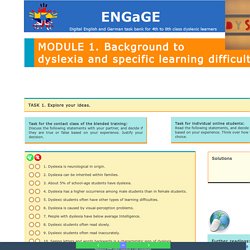
In the USA the Diagnostic and Statistic Manual of Mental Disorders of the American Psychiatric Association uses the label specific learning disorder. In Canada, Australia and the United Kingdom, the terms learning disability and learning difficulty are in use. The labels learning disorder and learning disability are appropriate in the field of biology, medicine and psychology where the focus is on examining the exact nature and cause of SpLDs. In the field of education in the United Kingdom, individuals are often described as having specific learning differences, which reflects the view that if institutions meet the differing needs of students, these learning differences might lose their relevance.
DSM-5 groups various sub-types of SpLDs, such as dyslexia (word-level reading difficulty) and dyscalculia (mathematics disability), under a joint umbrella term of SpLDs. Dyslexia and the Brain: What Does Current Research Tell Us? Click the "References" link above to hide these references.
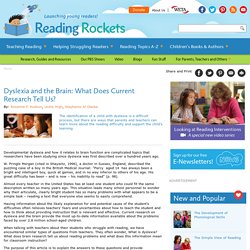
Adams, M.J. (1990). Beginning to read: Thinking and learning about print. Cambridge, MA: MIT Press. American Optometric Association. (2004). Kormosandsmithchapter2.pdf. Debunking the Myths about Dyslexia. Upon completion of this section, you will: Be able to discern fact from fiction concerning common dyslexia myths See that dyslexia is commonly misunderstood by the general public There are many signs or clues to dyslexia which are discussed in depth on this website; however it is also important to be aware of the misconceptions and myths surrounding the disorder.
